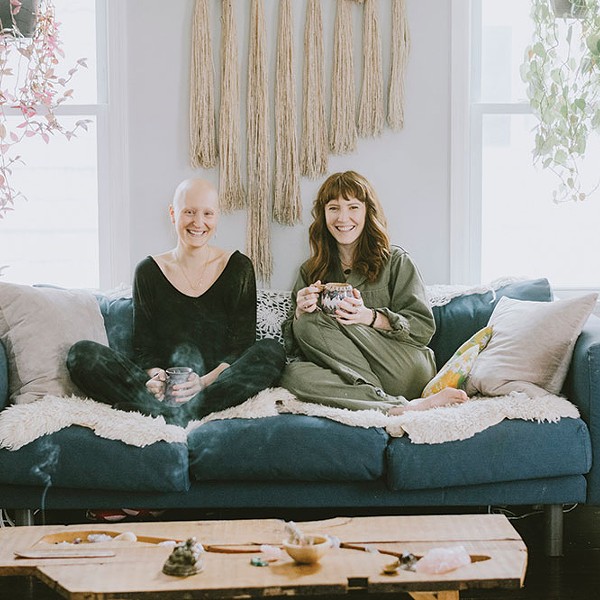Pregnancy can be an anxious time even in the best of circumstances, given the uncertainties of labor, birth looming, and concerns about the baby's health. Tie in a global pandemic to initial anxiety and expectant mothers can feel a whole new level of angst, compounded by the essence of loneliness that seems to be a sign of the times. It's feelings like these that Gabrielle Geilman finds herself navigating these days in her third trimester of pregnancy. New safety measures at hospitals and clinics, including strict limits to the number of people who can attend a birth, have made pregnancy more isolating for Geilman, a student from Ellenville who's planning to deliver her baby at Catskill Regional Medical Center. "I'm disappointed that I'm only able to have one person in the room," she says. "I understand that it's for safety reasons, but delivering a baby can be a stressful time, and it would be nice to have my whole support system there."
To top it off, due to health precautions, she has had to go solo to her last round of prenatal check-ups. "My partner is unable to come to my ultrasounds with me or any of my appointments," she says. Despite understanding, Geilman touches upon the sadness she gets from not being able to share these moments with her partner or family. "They won't allow anyone in the room with me, so I have to experience these special moments alone."
Coronavirus Adjustments
Even though the spread of COVID-19 has virtually stopped the world around us, pregnancies continue their inevitable forward march. In the United States alone, an average of 432 babies are born every hour, according to the Centers for Disease Control (CDC). Now, mothers-to-be must juggle concerns about contagion and new hospital restrictions alongside all the normal end-of-term preoccupations like due date and labor and delivery anxieties in this bizarre and unprecedented historic moment. These pandemic times are prompting a lot of expectant parents to reassess their birth plan, whether they're welcoming their new baby at a hospital, a birthing center, or even at home.While plans that were definite for months change and global anxiety rises, mothers-to-be also face concern about contracting the virus. Although the CDC has said that pregnancy does not appear to increase the risk of infection in women, mothers-to-be are at a higher risk for severe illness if infected. The risk of passing the infection to a fetus also seems to be very low with the data they have. The CDC encourages mothers-to-be to practice the same preventive measures as the general public, like avoiding gatherings with people, washing their hands often, and disinfecting regularly touched surfaces frequently. However, protective measures don't always ease anxiety.
On their end, hospitals are developing precautionary measures to protect both the mothers-to-be and the newborns. Sarah Colomello, manager of public and community affairs of Nuvance Health, speaks on behalf of Vassar Brothers Medical Center, Northern Dutchess Hospital, Putnam Hospital Center, and Sharon Hospital about deliveries during this time. "All of us at Nuvance Health are making decisions with the safety of our mothers and babies as our first and main priority. We are well-prepared to care for them and their baby," Colomello says. "In general, the cleaning substances our birth centers and maternity departments currently use with bactericidal and viricidal properties are adequate for COVID-19. However, we have taken added precautions, such as more frequent sterilization of patient and staff areas, equipment, and high-touch surfaces."
Colomello also mentions that many of new regulations are in place for the mother's benefit. For example, maternity patients are allowed one support person only if that person drops off the mother-to-be and waits in their vehicle until further notice. Once the patient is in active labor, the support person will be screened for COVID-19 risk factors and if they pass, they're allowed in. From there, the support person must stay with the patient during labor and after. If they exhibit symptoms and don't pass a screening, they may have to leave the hospital. With such cases, another support person could be screened and allowed in. Likewise, those who wish to visit the mother at the hospital will have to wait because of new restrictions. To protect the mother and newborn, no visitors are allowed to enter the room besides the partner. At discharge, mothers and their partners now have to wear face masks, the fashion statement of our pandemic times.
Mid-Pregnancy Pivot?
Still, with hospitals regarded as COVID-19 hot spots, home birth has taken on new appeal for pregnant women previously planning hospital births. Susanrachel Condon, licensed midwife and OB-GYN nurse practitioner of the private practice River and Mountain Midwives, reports that her team saw a spike in inquiries after the state limited the number of people allowed in the delivery room. But she doesn't advise changing your birth plan mid-course. "Home birth is a paradigm; it's not just about where your baby comes out of your body," Condon says. "People who have been anticipating a hospital birth for many months don't have the same level of education about home birth and they often don't have a relationship with a care provider."
For parents planning hospital births, Condon recommends researching their institution to understand the regulations so they are not surprised or taken aback by anything. Also, she advises mothers-to-be to stay home as long as possible—common advice for laboring women that feels even more appropriate these days.
Since the start of the pandemic, Condon has already performed several at-home deliveries and explains that the meticulous process includes many precautionary measures. Midwives have all of their equipment in one plastic box that's easily cleaned; they wash their hands and change their clothes upon arrival and when they leave; and there is individual sanitization of any item that touches a person before it makes its way back into the box.
Mother-to-be Jeanne Brooks, a business consultant from Woodstock, is 36 weeks into her pregnancy and has been planning and preparing for a home birth since the beginning of her pregnancy. With the current state of the pandemic and the increased risk associated with going to the hospital, she feels relieved about her decision. However, as with every home birth, she knows there is always a chance of ending up at a hospital anyway. "One of the things that has been scaring me the most about potentially going to the hospital is that you can only have one person in the room with you, so I would either have to have my partner or my midwife in the room," says Brooks. Because her partner is immunocompromised, a hospital trip has extra risks for her family. "I don't know that I feel it would be safe for [my partner] to be in the hospital with me."
Some mothers have already had to deliver at home during quarantine. Rebecca Azzi went into labor and delivered her new son on April 13, describing the moments leading up to it as anxiety-inducing. Azzi—a full-time mom and part-time Mary Kay beauty consultant—delivered her first two children at St. Anthony's Hospital in Warwick and was planning no different for her third child. "The first eight months of my pregnancy, we were very calm and peaceful since this is our third baby," she says. "We kind of felt like we had an idea of what we were in for, and that there were no complications." Azzi and her partner had thought about switching to home birth for their third child and discussed a home birth with River and Mountain midwife Susan Rannestad at the beginning of the pregnancy. However, to stick with what they knew, they ultimately decided on a hospital birth.
When COVID-19 came spiraling into New York, Azzi was a bit shook up. "Things quickly escalated, and as places started closing and schools started shutting down, my anxiety went through the roof," she says. "It was really scary to think about bringing a baby into this new world that we had just been thrown into." At the same time, hospital regulations shifted to only one support person in the delivery room, which led Azzi to have another chat with Rannestad—a conversation that led her to renting a birth tub and delivering in her home. "She was so reassuring and calming, and since we had already met months before and she was familiar with us and our case, she was willing to take us on," says Azzi. "The home birth brought me such peace. It's hard to put into words how much peace there was, but it was just nice to be at home and to know that we didn't have to leave the house when I went into labor."
Azzi treasures the experience because of how much it reduced and continues to reduce her anxiety. Home births allow for postpartum care, so she still doesn't leave the house for pediatric visits. "The biggest thing for me was how we could protect ourselves while trying to bring the new baby into this," she says. "I had a lot of anxiety about someone in my family or support team getting sick."
Pushing Through
Azzi's birth plan pivot, while ultimately successful for her and her family, is not recommended by medical professionals. The best thing pregnant women can do is to relax, stick to their plan of delivery, and labor at home for as long as possible. Dr. Kimberly Henderson, OB-GYN with Health Quest Medical Practice, put it simply: "Birth can be very unpredictable in the best of times, and I believe that adding a completely new paradigm [changing your delivery location] to a birth plan late in pregnancy can add even more uncertainty."
Following birth, extra precautions should also be taken to keep the mother and baby safe from infection. "Although friends and family will be anxious to meet a new baby, parents should limit the baby's exposure to as few people as possible for as long as there are federal and state guidelines in place for social distancing," Colomello says. Though new precautions and measures create complications for those expecting, they're in place to provide the happiest outcome of all: both a healthy newborn and mother.


















